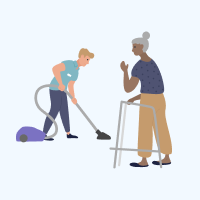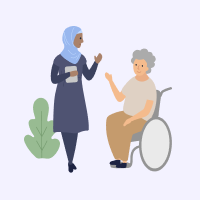A chronic disease is a long-term condition that doesn’t get better on its own and is not cured completely.
Caring for someone with a chronic disease is challenging and emotionally draining. This is because the progress of the disease, and the changes this may cause in the person you’re caring for create a difficult situation. Finding out all you can about their particular condition and how to manage it can help.
There are many tips and resources online that may help you look after a person with a chronic disease.
What are some common chronic diseases?
Some of the most common chronic diseases affecting older people are:
- asthma
- arthritis including osteoarthritis and rheumatoid arthritis
- cancer
- coronary heart disease
- dementia
- diabetes
- oral disease
- osteoporosis
- stroke
- mental health conditions (read more on the Head to Health website)
- chronic kidney disease (read more on the Kidney Australia website)
- chronic obstructive pulmonary disease (read more about the Australian Lung Foundation)
For more information, visit the healthdirect website.
Self-managing chronic diseases
As a carer, you play an important role in helping the person you care for do what they can to manage their own chronic disease. Self-management is about:
- learning what you can about the disease, its treatment and management
- understanding the medications prescribed
- building skills to help manage the fatigue, pain, frustration and isolation that people with chronic disease often get
- communicating effectively with health professionals by answering questions accurately, asking your own questions and making sure you understand the information given to you. Remember that if you want to speak to health professionals about the chronic disease of the person you care for, you will need the person’s written consent. Ask the health professional about the best way to do this.
- improving nutrition and general health
- including activity and fitness sessions in daily routines
- practising relaxation techniques and problem-solving skills
- finding and accessing community support groups and other useful resources
- managing emotions that often seem to be part of everyday life.
The person you care for may also like to attend an information session designed for people living with chronic conditions. Contact your local GP for more information on courses in your area. You can also search for courses using the National Health Services Directory.
What services can help?
If you're caring for an older person at home, there are many aged care services that may support them to maintain their independence. These services may include help with day-to-day personal care activities such as dressing or grooming, household tasks such as cleaning and washing, or even home maintenance such as changing light bulbs or keeping the lawn mowed. Read more about help at home services.
Or, you may feel that the person you care for needs the supported environment of an aged care home to help manage their chronic disease. Read more about moving into an aged care home.
Carer Gateway
Carer Gateway is a useful source of information on services and supports for caring for someone with a chronic disease.
Allied health services
Allied health services such as physiotherapy, osteopathy, diabetes educator, exercise physiology, psychology and other selected complementary and alternative therapies such as acupuncture may also be helpful in treating chronic diseases.
My Health Record
A My Health Record will also help with managing chronic diseases. It allows you and your doctors, hospitals and other healthcare providers to view and share your health information to provide you with the best possible care. For more information, see the My Health Record website.
Goods and equipment
If you're living with a chronic disease, there are various goods and equipment that may help with day-to-day living activities. You can visit an Independent Living Centre to try out products on display and talk to the centre's occupational therapists on their information lines. Visit the Independent Living Centres website to find your nearest centre.
Medicare benefits
Some services for chronic disease management (known as 'primary care services') may be subsidised by the Australian Government through Medicare. The Medicare Benefits Schedule website lists Medicare services that are subsidised by the Government. You can also ask your doctor about these services.


